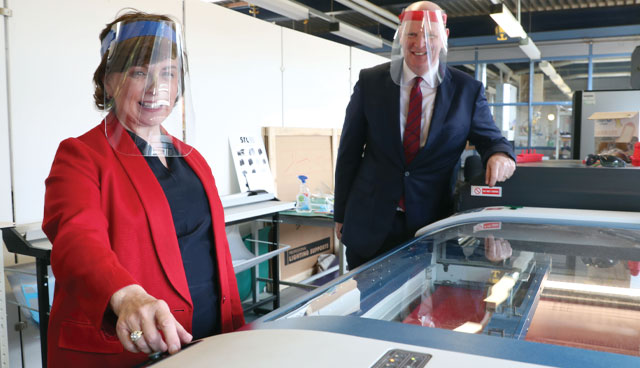Diane Dodds: Economic recovery

Minister for the Economy Diane Dodds speaks to David Whelan about efforts to rebuild the economy in Northern Ireland.
As Northern Ireland seeks to recover from the aftermath of the economic impact of lockdown measures, the Minister for the Economy recognises the important role of policy in delivering a long-term roadmap for growth.
Highlighting the “monumental change” which has occurred in the eight months since taking up her post, Dodds frames the context in which ambitions for economic growth are being created as much changed but believes the fundamental principles remain largely the same.
Covid has been unprecedented and we have taken action that we never thought we could take, with a speed that we didn’t know was possible. My department has given out close to one third of a billion pounds in grants to help sustain businesses in very difficult circumstances. But has it really changed the overall goals for the economy? I would suggest that those overall goals remain relatively similar,” says Dodds.
In January, the New Decade, New Approach agreement outlined a series of ambitions to be pursued by the newly formed Executive, all of which were expected to underpin an upturn in Northern Ireland’s economic fortunes, including the recognised need for a long-term economic strategy and a future skills strategy.
By March, the scale of the measures that would be required to reduce the spread of the virus became evident. Discussing the significance of these measures on the economic outlook, Dodds says: “Covid has been an unprecedented disruption to our economic life and indeed, for many, our economic wellbeing. Lockdown, although crucial for public health, has caused severe economic disruption and as highlighted by economists, each month was akin to a major recession in itself.”
Although many of the economic impacts of the pandemic are still to be realised, initial indicators of the scale of the recession lie in the form of a spike in unemployment, depressed consumer spending and sector-specific downturns, including, but not limited to, tourism and hospitality.
However, Dodds is keen to highlight that not all the economic impacts of the pandemic have been negative, outlining the “remarkable resilience” of the digital sector of Northern Ireland’s economy which has seen it continue to trade strongly.
“Even in the depths and darkest days of lockdown, we were announcing job creation in the sector,” she states, pointing out that Northern Ireland has carved out niche areas, such as cyber security, in which it is a world leader. It’s on these strengths that she advocates a move to “reopen, rebuild and reboot”.
Quizzed on whether she believes the right balance has been struck between managing the public health risk and the risks posed to Northern Ireland’s economic future, Dodds says: “These are challenging times and there isn’t a manuscript for dealing with them. Never before have we taken such drastic action in relation to our own economy.

“We recognise that first and foremost we must keep people safe. That includes the general public, the customer and those people working to deliver services. I have reiterated many times that employers have a duty to ensure their workforce is operating in a safe environment but at the same time we have to give confidence that it’s safe to go out and about and to do things in an ordinary way.”
“Covid has been an unprecedented disruption to our economic life and indeed, for many, our economic wellbeing. Lockdown, although crucial for public health, has caused severe economic disruption and as highlighted by economists, each month was akin to a major recession in itself.”
Recently the Department for the Economy (DfE) published its medium-term recovery plan in the shape of the ‘Rebuilding a Stronger Economy’ document, which Dodds says identifies opportunities to “regrow and reorientate” in sectors of the economy where the Department envisages “new and exciting” opportunities.
“In our recovery plan we said that we want to continue to support those areas of the economy that are fundamental and important to us,” she says. “Those are the likes of tourism, hospitality, agri-food and general manufacturing but there are also opportunities to take that world-leading expertise that is here and to go out and grab new things for Northern Ireland.”
Dodds points to the likes of cyber security, fintech, legaltech and advanced manufacturing as examples of areas where these opportunities lie. Additionally, she points to the opportunity in moves towards a greener economy, and in particular how the future role of hydrogen can help to not only reduce carbon emissions but also create jobs and, ultimately, prosperity for people in Northern Ireland.
However, in looking to the future, the Minister is also aware of the need to address the immediate pressures on the labour market. Recent statistics show a steep rise in unemployment and the figure is expected to elevate again significantly once the UK Government’s Job Retention Scheme (JRS) comes to an end. Of those set to be most affected, both in terms of their propensity for precarious work or work in those sectors hardest hit by the pandemic and those set to leave education to join the workforce, are young people.
The Minister outlines her ambitions to bring forward a package of interventions around developing apprenticeships in the near future, keeping young people employed and extending career pathways.
Again, she emphasises the importance of a digital focus and believes this area is best placed to serve the labour market demand of the future. To this end, she suggests that plans to develop apprenticeships and training will also extend beyond young people to address the more wide-spread need for re-skilling.
Additionally, she highlights recent collaborations between her department and that of the Department of Education to ensure that Northern Ireland’s “digital spine” can be developed by introducing skills in early education.
“I think there are huge opportunities for us to respond in the short term but also to have those medium- and long-term goals of improving digital and skill infrastructure in Northern Ireland,” she says.
Dodds suggests that the digital focus will be a feature of a new skills strategy for Northern Ireland currently being developed by her Department and this will be supported by investment in digital infrastructure, such as that of Project Stratum, the scheme designed to improve connectivity for those unable to access broadband services of 30 Mbps or greater across Northern Ireland, which she says she is determined to see rolled out during the current mandate of the Northern Ireland Assembly.

“I think it’s important, not just to get a community in Northern Ireland that is highly skilled and has a good range of digital skills but also to help address the regional imbalances in our economy. Project Stratum has a target area which is 97 per cent rural, so it’s really important that we get to task with that.”
Skills
Addressing the ambitions of a future skills strategy, Dodds says: “We really want to look at the skills imbalances and to work across departments to ensure that we are upskilling, reskilling and giving career pathways and ultimately jobs and prosperity to all of our people in Northern Ireland.”
One of the challenges facing a future skills strategy for Northern Ireland and ambitions to reduce the skills gap between Northern Ireland and its UK counterparts is access to migrant labour. Workers from the EU have been critical to improvements in Northern Ireland’s labour market in the last decade, particularly in the high employment but low-paid sectors such as tourism, hospitality, agri-food and manufacturing.
In January 2021, the end of the UK’s transition period with the EU will mean that EU workers will join the visa system previously used for non-EU migrants. The Migration Advisory Committee (MAC), the independent body set up to advise government, recently published recommendations to lower the wage threshold for those seeking to work in the UK but did not recommend a regional variation lobbied for by many in Northern Ireland. The wage threshold set of £25,600 (£20,480 if the role is included on the UK’s shortage occupation list) is still above the median pay for EU26 workers in Northern Ireland of £18,000.
The make-up of the shortage occupation list is not devolved and Dodds has been forced to lobby for recognition of Northern Ireland’s unique circumstances.
“I am one of the people who have lobbied long and hard for the reduction of the salary limit around the MAC report,” she states. “That remains my goal because obviously our economy and those baselines are very different to the south of England. I make that point to the Prime Minister over and over again. If he is interested in levelling up the different regions of the UK, then he has to be interested in making sure that we have access to the skills that we need to make our economy work.
“We have done work and given evidence on our own priority agenda for skills in Northern Ireland and I think that is still worth working at. There are things in it that we need to improve from a Northern Ireland point of view and those are not new.”
However, with the restrictions set to come into play in January 2021, time for influencing the Government’s decision is running short.
“It’s my job to keep making the point and that is something that I will continue to do,” the Minister states.
The potential to move matters relating to Northern Ireland up the UK Government’s priority list has been heightened, Dodds believes, because of the increased levels of contact since the pandemic outbreak. Highlighting increased communications with the Department for Business, Energy and Industrial Strategy (BEIS) and with colleagues in the governments of all four devolved nations, Dodds says that digital technologies have surpassed expectations of how connected the governments can be.
“Obviously the national Government make national decisions, but we have plenty of opportunity to feed into those decisions.”
“We have huge difficulties. I have never sugar-coated the difficulties the Northern Ireland economy faces but I am hugely inspired by the way people have responded to Covid and the resilience of our economy.”
Funding
Critical to ambitions to recover and grow Northern Ireland’s economy will be the levels of finance available to support businesses and the labour market, while also supporting the roll-out of the Department’s future plans.
Dodds recognises the requirement for the Executive to financially support long-term commitments, such as rebalancing the skills agenda, which she says has been historically underfunded in Northern Ireland. On the more immediate supports needed, she is quick to point out the scale of finance which has already been allocated in relation to tackling Covid-19.
“Let’s be absolutely honest, whatever your political viewpoint or whatever you think about the constitutional question, the interventions that the national Government have used here in Northern Ireland have been unprecedented.
“The Job Retention Scheme and the Self-Employment Scheme are imperfect, but they are massive interventions in the economy. Between those two schemes almost 300,000 people working in Northern Ireland have had their wages subsidised by Her Majesty’s Government.
“Those economic interventions are unprecedented and therefore, access to finance has been unprecedented. We will continue, along with Executive colleagues, to work to see where we can continue to support businesses in Northern Ireland and to support jobs.”
Energy
One of the advantages of the breadth of the Department for the Economy’s portfolio is its reach to responsibility for energy. With global recognition of the opportunity to install efforts to tackle climate change at the heart of efforts for economic recovery, Dodds signifies a similar approach for Northern Ireland. “We have made it very clear in our short- and medium-term plan for the economy that the green economy is very important to recovery. Northern Ireland’s achievements to date, 47 per cent of electricity generated from renewables, is pretty remarkable. Now, is there much more to be done? Of course there is, and that’s where we will need to continue to work to make sure that we are continuing on that pathway.
“By the end of this Assembly mandate I want to have an energy strategy for Northern Ireland that plots the course for the future. It’s important and embedded at the heart of that will be that green recovery, helping not only with our emissions reduction but also providing us with jobs and prosperity.”
Concluding, Dodds is optimistic that a long-term economic strategy being developed by the Department, and assisted by advice from the newly reformed Economic Advisory Group, will help those sectors in Northern Ireland already considered world class to “go out and grab more for the Northern Ireland economy”. However, she is also aware of the scale of the challenge.
“We have huge difficulties. I have never sugar-coated the difficulties the Northern Ireland economy faces but I am hugely inspired by the way people have responded to Covid and the resilience of our economy.
“Next year is Northern Ireland’s centenary year. One hundred years ago, we led the way in ship making, rope works and linen manufacture. In the next 100 years we need to grab the economy of the future and those things that will drive the economy.”





